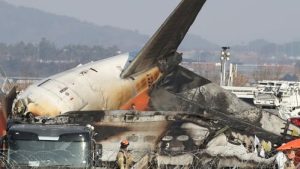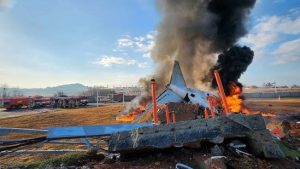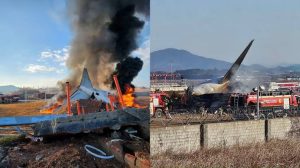Digital News Guru New Delhi Desk:
On December 29, 2024, South Korea witnessed one of its deadliest aviation disasters in recent history. A Jeju Air flight, en route from Bangkok, Thailand, to Muan International Airport in South Korea, crashed upon landing, claiming the lives of 179 people. The tragic event has left the nation and the global community in mourning, prompting urgent calls for improved aviation safety measures.
Details of Plane Crash in South Korea
The ill-fated aircraft, a Boeing 737-800 operating as Jeju Air Flight 2216, was carrying 175 passengers and six crew members. As the plane attempted to land at Muan International Airport, it skidded off the runway, collided with a concrete barrier, and erupted into flames. The harrowing incident resulted in the deaths of all but two crew members, who sustained critical injuries and are currently undergoing treatment.

Preliminary investigations suggest that a failure in the aircraft’s front landing gear led to a belly landing. Eyewitnesses reported a loud explosion as the plane veered off course. Emergency response teams were dispatched immediately, but the intensity of the fire hampered rescue efforts.
Potential Causes
While the exact cause of the crash is still under investigation, early reports point to a combination of mechanical failure, adverse weather conditions, and possibly a bird strike. The aircraft’s flight data recorders, commonly known as the black boxes, have been recovered and are expected to provide crucial insights into the sequence of events leading up to the crash.
Experts are also examining maintenance records, the pilots’ training logs, and operational procedures to determine if there were any lapses. Investigators are working closely with Jeju Air, the aircraft manufacturer, and international aviation bodies to identify potential contributing factors.
Impact on Victims and Their Families
The majority of the victims were South Korean nationals, with two Thai passengers among the deceased. Among the casualties was a three-year-old boy, highlighting the devastating personal toll of the accident. Families of the victims have been provided with support by South Korean authorities, including counseling services and assistance with the identification process.
The emotional impact of this disaster has reverberated across the nation. Vigils have been held in honor of the victims, and messages of condolence have poured in from global leaders and citizens alike.
Jeju Air Under Scrutiny
Jeju Air, a leading low-cost carrier in South Korea, had maintained a strong safety record prior to this tragedy. However, the crash has brought the airline under intense scrutiny. Questions are being raised about the aircraft’s maintenance and the operational protocols followed by the airline. The company’s CEO has expressed deep remorse over the incident and pledged full cooperation with the investigation.

This crash marks a turning point for Jeju Air, as it faces heightened oversight from regulatory authorities. The airline has temporarily grounded its fleet of Boeing 737-800s to conduct thorough inspections and ensure passenger safety in future operations.
Airport and Emergency Response
Muan International Airport, where the crash occurred, has been temporarily closed. All incoming and outgoing flights have been diverted to nearby airports as authorities carry out recovery operations and a comprehensive assessment of the airport’s facilities.
Emergency response teams, including firefighters, paramedics, and disaster management personnel, worked tirelessly to contain the fire and recover the victims. Their efforts, although heroic, were hindered by the scale of the disaster and the challenges posed by the wreckage.
Calls for Improved Safety
The incident has sparked nationwide discussions on aviation safety. Experts and advocacy groups are urging stricter regulatory oversight and the adoption of advanced safety measures to prevent similar tragedies. Proposals include more rigorous inspection protocols for aging aircraft, enhanced pilot training, and the use of advanced technologies to detect mechanical issues in real time.
South Korea’s Ministry of Land, Infrastructure, and Transport has vowed to conduct a thorough investigation and implement reforms to improve aviation safety standards. This commitment is seen as a crucial step in restoring public confidence in the country’s aviation industry.
A Nation in Mourning
The South Korean government has declared a 7-day national mourning period. The tragedy has united the nation in grief, as citizens offer their condolences and support to the affected families.

International leaders, including those from Thailand and the United States, have expressed solidarity with South Korea. The global aviation community has also extended its condolences and pledged to learn from this incident to enhance safety standards worldwide.
Conclusion
The South Korea plane crash is a sobering reminder of the risks associated with air travel and the importance of maintaining the highest safety standards. As investigations continue, the focus remains on uncovering the truth behind this tragedy and preventing such incidents in the future. For the families of the victims and the nation as a whole, the loss is immeasurable, but the lessons learned from this disaster could lead to meaningful changes in global aviation safety practices.
You May Also Read: Indian Cricketers’ Glamorous Partners: A Blend of Stardom and Strength








